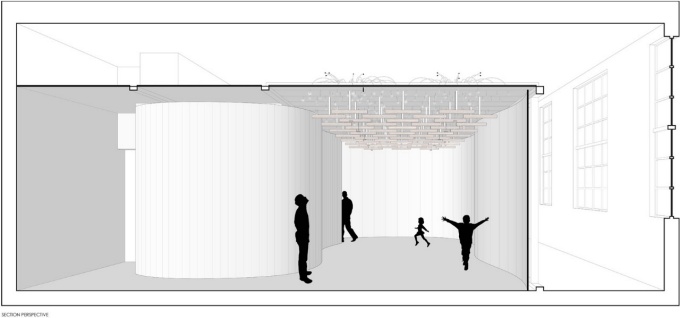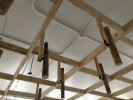Pluvius

Imagined by the Situated Technologies Graduate Research Group, the installation utilizes sensing technologies to integrate sound, light, and motion, and acts as a means to investigate questions of spatial contingency and the limits of predictability through an interactive, multi-sensory experience.
Gallery
Students
Shayan Amirirad
Nishika Niraj Dhariwal
Aubry Fan
Zach Fields
Heidi Flores
Ramola Khamitkar
Frank Kraemer
Jelani Lowe
Rania Moussa
Devanshi Shastri
Faculty
Mark Shepard
Jason Geistweidt
Term
ARC 606/617, Fall 2018
Program
MArch–Situated Technologies
Pluvious (adj.): of or relating to rain
The installation Pluvious is a responsive environment that evokes the childhood sensation of playing in the rain.
The studio initially began by analyzing their own workspace using a variety of electronic sensors; they cataloged the environmental data of lighting, movement, weather patterns, and sounds. These various investigations allowed the studio to develop a systematic way of collecting data from a variety of sources and subsequently translate that into architectural form. As they channeled the incoming data into an instruction set, students used these natural sources to create the responsive apparatuses and immersive experience of rain inside the studio.
Sound can lead a project into a different direction, one that activates all the other senses besides sight.
– Heidi Flores, MArch
Custom-built rain sticks, suspended from the ceiling and attached to motorized arms, are activated as the occupant moves throughout the space. Lights embedded in the ceiling pierce the darkness and follow the user as well, creating a movable, personal raincloud within the installation.
As a group, Situated Technologies studies how integrated technology and interactive media can change how a person feels, thinks, and behaves within or around architecture.
Group member Heidi Flores turned to her experience as a musician to help inform the installation. While she realizes that many people are immediately drawn to aesthetics, she is most interested in how technology can change how a person react to and behave within a space





.jpg.thumb.100.140.jpg)

.jpg.thumb.100.140.jpg)

